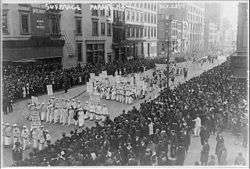Missionary Generation
| Part of a series on |
| Generations |
|---|
The Missionary Generation was the name given by sociologists to describe the generation of people born in the United States from 1860 to 1882. It is an identified cohort within the Strauss–Howe generational theory.

Characteristics
Members of the Missionary Generation have been described as the "home-and-hearth children of the post-Civil War era". They were an idealist generation and as young adults, their leaders were the first graduates of newly formed black and women's colleges.
They rejected the strict Victorian values, questioned gender roles and feared society would become soulless, inhumane, and money-driven.[1]
Their defining characteristics were missionary and social crusades, "muckrake" journalism, prohibitionism, workers' rights, trade unionism and women's suffrage.[2] In midlife, they developed Prohibition in the United States, immigration control, and organized vice squads.
Because the Lost Generation were so decimated by World War I, the leadership of the Missionary Generation lasted longer than previous generations and in the 1930s and 1940s, their elite became the "Wise Old Men" who enacted a "New Deal", Social Security, led the global war against fascism, and reaffirmed America's highest ideals during a transformative era in world history.
This generation is fully ancestral, with the last known member of the Missionary Generation, the American Sarah Knauss, having died on December 30, 1999 at 119 years of age.
Sociologist Naomi Schaefer Riley believes that a new "Missionary Generation" is forming in the children of the 2010s.[3]
Notable persons
The following list includes some of the notable persons who influenced this generation:
Politics
Stanley Baldwin, Neville Chamberlain, Winston Churchill, David Lloyd George, Ramsay MacDonald, Joseph Cook, Andrew Fisher, Billy Hughes, Joseph Lyons, Earle Page, James Scullin, Chris Watson, R. B. Bennett, William Lyon Mackenzie King, Arthur Meighen, Gordon Coates, George Forbes, Michael Joseph Savage, Vladimir Ilyich Lenin, Franklin Delano Roosevelt, Mahatma Gandhi, Douglas MacArthur, Joseph Stalin, Warren Harding, Calvin Coolidge, Herbert Hoover, Charles Curtis, Charles G. Dawes, John Nance Garner, William Jennings Bryan, Konrad Adenauer Leon Trotsky
Science
Albert Einstein, Madame Curie, Guglielmo Marconi, Albert Schweitzer, Carl Jung, Ernest Rutherford, Roald Amundsen, W.E.B. DuBois
Literature
William Butler Yeats, Rudyard Kipling, Beatrix Potter, H.G. Wells, Edgar Rice Burroughs, A.A. Milne, James Joyce, Upton Sinclair, Thomas Mann, Anton Chekhov
Music
Gustav Mahler, Claude Debussy, Jean Sibelius, Igor Stravinsky, Enrico Caruso, Arturo Toscanini, Béla Bartók, Pierre Monteux, Fritz Kreisler, Pablo Casals
Art
Feminism
References
- ↑ Generational Cycles at so-called Millennials.com.
- ↑ Generational Cycles.
- ↑ Douglas Jacobsen, Rhonda Jacobsen, The American University in a Postsecular Age (Oxford University Press, 2008).